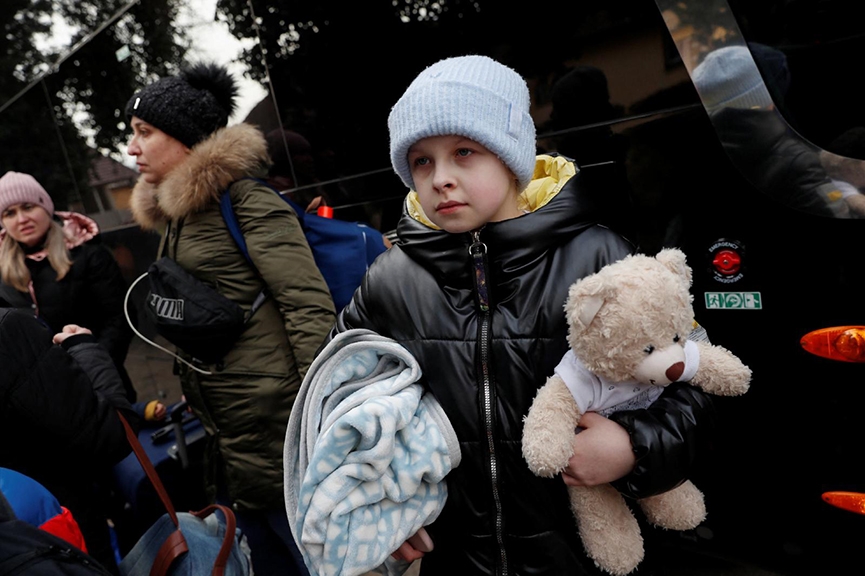
VATICAN CITY. The flood of support from people inside and outside Ukraine is a source of strength and hope for the people receiving aid and for the Caritas organizations coordinating efforts, said two Caritas directors from Ukraine.
Pallottine Father Vyacheslav Grynevych, director of Caritas-Spes, said the prayers, assistance and offers to help are so important for them “to see that we are not alone in this terrible situation.”
He also urged people to reach out to and spiritually support Ukranians who are living in other parts of the world and who are worrying about family members in conflict zones.
Tetiana Stawnychy, president of Caritas Ukraine, said, “I can’t emphasize enough the expressions of solidarity that we see at every corner inside the country; it’s very inspiring.”
They spoke from Ukraine March 1 during an online news conference organized by Caritas Internationalis to discuss the current situation in the country.
Caritas Ukraine (@caritasukraine) and Caritas-Spes (@SpesUkraine) have been helping thousands of internally displaced persons who have been seeking safe shelter, both in Western Ukraine and abroad, said Caritas Internationalis. With the support of at least 35 other Caritas organizations, the two local charities have been providing essential information, hot food, drinking water, personal hygiene kits and safe places for shelter.
Caritas Internationalis launched an emergency appeal at the end of February for donations so it can help sustain the work the two organizations are providing on the ground.
At the March 1 news conference, Aloysius John, secretary-general of Caritas Internationalis, underlined the importance of Caritas centers and outreach.
He praised the generosity of so many people who have been giving whatever they can to Caritas. “Driven by an inner urge to help their brothers and sisters, they gave means to help fulfill the mission of Caritas – love.”
“In this moment of tragedy, for these people, the Ukrainians, being in solidarity with one another is an island of hope,” he said.
But, he added, the confederation is also “highly concerned about the safety of thousands of migrants and refugees living in Ukraine and subject to discrimination. They also need to be treated with dignity and compassion at this tragic moment and be given unconditional protection.”
As part of the confederation’s emergency appeal, Father Grynevych said Feb. 26 that “our cities, homes and kindergartens have been destroyed. But no one will succeed in destroying our aspirations for peace and freedom” or stop them from helping people.
Father Grynevych and his confreres opened their doors to their neighbors who sought protection in the basement of their church and house after the bombing on Kyiv started Feb. 24. They have been providing shelter and comfort to 37 adults and children as well as their pets, he said.
“So we have a small zoo,” said the priest, who has posted pictures on his Twitter feed, @VGrynevych, of how the attacks have been frightening Kesha, a small blue parrot, and Ryzhyk, an orange tabby.
Their human guests remain hopeful, Father Grynevych said, and sharing a roof and meals each day “unites us.” However, “most grocery shops are empty” and a nighttime curfew means people are only allowed to move around the city during specific times of the day, he added.
Young people have shown “so much heroism” in their willingness to help, he said, and volunteers for Caritas-Spes have adapted to the circumstances in Kyiv, working in whatever spaces remain safe and remaining committed to responding to people’s needs. With 67 employees and 120 volunteers, Caritas-Spes is helping nearly 2,000 people.
He said they have shelters stocked and operating in five cities, including one for patients at a pediatric and maternity hospital. They have set up an emergency office in Warsaw with Caritas Poland in case the war intensifies and “we lose communication with the rest of the world,” he added.
Ireneusz Krause of Caritas Poland said they have reception centers on their side of the border with Ukraine providing assistance, and the government is ready to help host 7,000 Ukrainian orphans.
About 400,000 people have crossed the Polish border already, he said at the news conference. They coordinate the 45 diocesan Caritas offices in Poland, and each is ready to accept as many people as they can.
Stawnychy said the situation is “tense,” difficult and “very volatile,” which means priorities, needs and places needing help change quickly. Just that morning, March 1, the center of Ukraine’s second largest city, Kharkiv, was bombed. Rockets hit civilian infrastructure and a social “village” run by a partner organization for foster children, who luckily had already been evacuated, she said.
Right now, there are about 25 welcoming centers throughout the country, providing hot food, a warm place to sleep and psychosocial support, she said. One Caritas partner is at a border point where people, mostly women and children, have been trying to cross, she said. They have been working with the International Organization for Migration to assess how to better answer the growing needs there, she added.
The biggest challenges right now, Stawnychy said, is getting material aid into Ukraine to bring to areas experiencing severe shortages as well as establishing humanitarian corridors for the safe and secure passage of aid and aid workers.
“My appeal would be just, let’s stay together and get through this together, stay the course,” she said.









